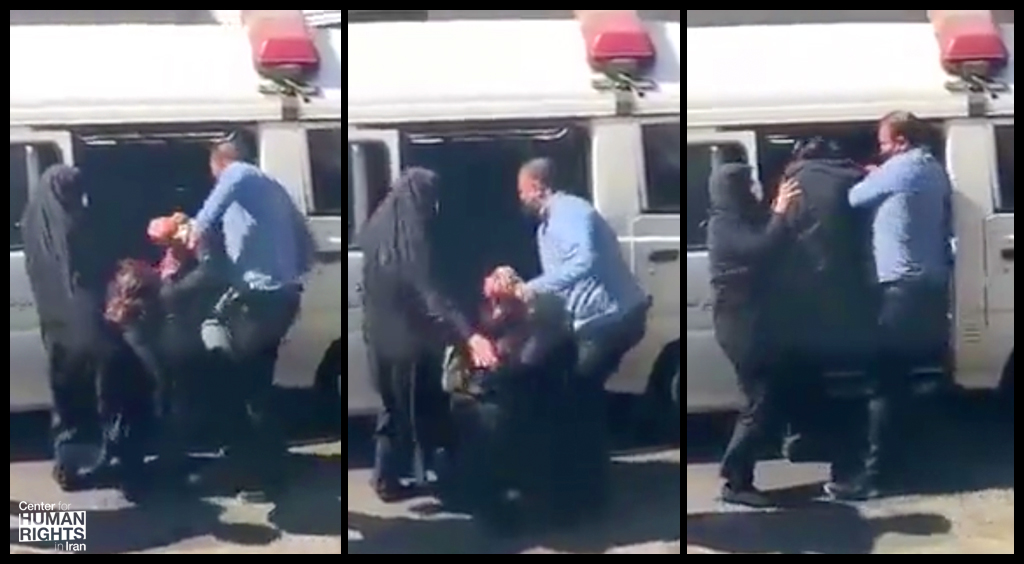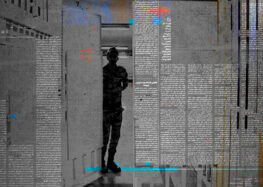Iranian Women Face Increased Violence as State Resumes Forced-Veiling Patrols
 Fact-Finding Mission on Iran Must Vigilantly Monitor, Document Associated Abuses
Fact-Finding Mission on Iran Must Vigilantly Monitor, Document Associated Abuses
UN Should Call on Islamic Republic to Repeal Compulsory Hijab Law
July 18, 2023 – Women and girls in Iran face increased violence, arbitrary arrests and heightened discrimination as the Islamic Republic re-activates its forced-veiling police patrols, said the Center for Human Rights in Iran (CHRI) in a statement today. The UN and broader international community should explicitly call for the repeal of this repressive, dangerous, and discriminatory law, CHRI stressed.
“For the past nine months, the Iranian authorities have witnessed countless girls and women peacefully defying the Islamic Republic’s forced-hijab law,” said Hadi Ghaemi, executive director of the Center for Human Rights in Iran (CHRI). “In response, they are resuming their failing strategy of enforcing repressive policies against Iranian women while trampling the right to freedom of expression.”
“It is essential for the international community to stand with the women and girls of Iran and advocate strenuously for their safety, dignity, and fundamental human rights,” Ghaemi said.
On July 16, Saeid Montazer al-Mahdi, Deputy Police Chief for Cultural and Social Affairs, announced that “vehicle and foot patrols” would be deployed across the country to “deal with” women accused of not complying with the state’s forced-hijab law. The announcement was followed by reported instances of white van patrols in Iranian cities, with at least one video showing a hijab-less woman being assaulted by a veil-clad woman trying to force her into a white van.
Although there has been no official confirmation that the government has redeployed its so-called “morality police”—which has a documented history of harassing, assaulting and arresting women accused of defying the state’s forced-hijab law—several government, police, and judicial officials have announced that increased enforcement of forced-veiling in Iran though “police actions” has resumed.
CHRI urges UN human rights experts and Member States to demand the repeal of the compulsory hijab law by the Iranian government. The UN Human Rights Council’s independent, international Fact-Finding Mission on Iran should also vigilantly monitor the situation on the ground in Iran to document any instances of escalated violence against women by the patrols.
Anti-Forced-Hijab Advocate Arrested, Actress Sentenced to Prison
The announcement of increased forced-hijab enforcement in Iran this past weekend was followed on July 17 by the unlawful arrest of actor Mohammad Sadeghi, as he was livestreaming peaceful commentary against the abusive policy.
Sadeghi tried to livestream his arrest, which included state security agents entering and raiding his home without a warrant. The Fars News Agency in Iran, which is associated with the Iranian military’s Islamic Revolutionary Guard Corps, subsequently accused Sadeghi of being a “homosexuality advocate.”
CHRI calls for the immediate release of Sadeghi and all prisoners of conscience.
Since Iran’s nationwide anti-state protests began in September 2022—which were initially triggered by the killing in state custody of 22-year-old Mahsa Jina Amini, who was arrested for an allegedly improper hijab—Iranian authorities have targeted anti-forced-hijab advocates, especially actresses and others with large social media followings.
On July 18, 2023, actress Leila Bolukat became the latest individual to be sentenced to prison for allegedly not wearing a hijab; she was ordered to serve four months in prison and banned from working for two years, as well as banned from social media activity for five years.
The Iranian government has also promised to pass legislation that would further punish and persecute women for choosing what to wear in public through a range of additional punishments, including monetary fines, restrictions on accessing bank accounts and denial of other essential services, confiscation of personal vehicles, travel limitations, bans on online activity, and imprisonment.
Parliament Speaker Mohammad Bagher Ghalibaf promised the “Chastity and Hijab Law” would be ratified by mid-August, which would be a month before the one-year anniversary of Amini’s killing.
Resurgence of Forced-Veiling Enforcement Fuels Violence Against Women in Iran
The Iranian government’s intensified enforcement of forced-hijab regulations in July 2022, mandated by President Ebrahim Raisi and signed into a decree the following month, had devastating consequences. It was just a month later, on September 16, 2022, when Amini died after beatings she reportedly received in state custody.
Amini’s killing sparked the “Woman Life Freedom” movement, which erupted in September 2022 across Iran with protests, and still continues, albeit in smaller acts of civil disobedience.
During this period, the “morality police” (also referred to as “guidance patrol”) largely vanished from the streets—although there was always ambiguity regarding official state confirmation of the disbandment of the morality police.
Despite facing violent repression by the government during street protests—in which hundreds of peaceful demonstrators were killed by state security forces and over 20,000 arrested—countless Iranian women have sustained the movement by publicly appearing without veils. Many have documented their peaceful resistance through photos and videos shared online.
CHRI stresses that the resumption of forced-veiling patrols significantly raises the potential for a surge in violence against women, not only by the police patrols, but also by vigilante violence. Rigorous and continuous vigilance and support from the international community are vital.
“The hijab should be a choice, not a tool of state repression,” said Ghaemi. “Through coordinated actions, we can all play a pivotal role in pressuring the Iranian government to stop perpetuating violence against women.”
Read this article in Persian
This report was made possible from donations by readers like you. Help us continue our mission by making a tax-deductible donation.






